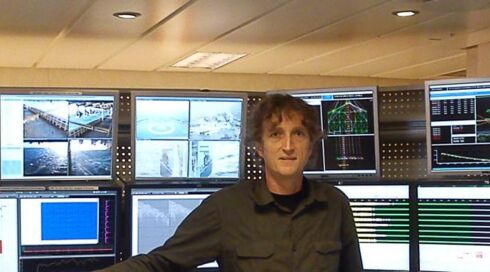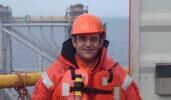5
Atlas Professional Tom Pritchard
Why this position, and why this industry?
“As a young schoolboy, even before then, I always wanted to go to sea. For five years I served in the Royal Navy, which really gave me a taste of what life at sea was like. It wasn't until 1988 that I began my career in the seismic industry. To be honest, at that time I didn’t have a clue what seismic exploration was about. 27 years later, I am still in the industry. The real world cannot compare to the seismic industry, where you always have to expect the unexpected. What keeps me motivated is that you never know where you will be going next and what will happen when you get there.
The rotas of four, five or six week trips with roughly the same amount of time off are a big plus. It allows you to plan well ahead for special occasions and holidays. When I first started in the industry, my father couldn't wait to tell all his workmates and friends that I would only be working six months a year and earning almost as much as they did – although they worked far more days and had far fewer holidays. They couldn't believe that jobs like these existed.”
How would you describe your job?
“The job has changed beyond all recognition from when I joined. The money certainly wasn't the big attraction back then. In the past, there were bars on board that were the main focal points when people were off shift. Nowadays, it is a bag of popcorn, a can of coke and a movie. Many vessels have well equipped gyms, which are used intensively. In today’s industry most companies encourage you to study. Technologically, the industry has moved forward in leaps and bounds. I am currently working on my 27th different survey vessel and have worked on ancient rust buckets better suited to the scrap yard right up to the most modern ship in the industry.”
And the Seismic & Electromagnetic industry?
“Where the industry was once very labour intensive, technology has taken over. Machinery is now operated at a distance by remote control boxes that can operate several pieces of equipment simultaneously. Years ago you would have needed a number of workers standing by to operate machinery pulling levers and pushing buttons. Manpower is still needed, however, all this technology needs to be maintained and repaired when things go wrong. That is where the mechanic comes in. You need the ability to strip down complex items of equipment, find the defect, repair and rebuild it, and have it back in service as soon as possible. Your skill set should include welding, knowing how to use hand-held power tools, the ability to repair electrical malfunctions, knowledge of hydraulics and high pressure air systems and the ability to come up with ideas on how to improve the overall safe and efficient operation of the vessel.
I have been contracting since 2008 and am willing to accept contracts as a mechanic, shift leader or gun chief. When I worked full time for companies I was a chief mechanic for five years, but I believe being flexible in my approach to work is what keeps me employed.
The biggest change I have seen over the years has been the increase in health and safety awareness. This has developed into a boom industry of its own. HSE rules every aspect of your life offshore and onshore, and I say this as someone who has worked extensively on vessels, rigs, power stations, refineries, shipyards and all types of heavy industry. Safety is vital when working in an industry full of potential hazards that can injure or even kill, but it’s sometimes frustrating when HSE loses sight of common sense.
One of my pet hates is sharing a cabin. As I've gotten older, I value my own free time and space. It disappoints me to see that companies are still building new vessels without enough cabins – especially when people are doing six month trips or longer.”
Thinking of progressing your career?
“I have probably reached my career peak in this industry after working as a Gun Chief. Currently, the idea of retiring any time soon doesn’t cross my mind as I still enjoy working. As long as there are companies that want to hire me and I feel fit for duty, I will work – be it as a mechanic or as a chief.”
What have the highlights been so far?
“Seismic is not just about the North Sea. I have been lucky to have visited over a third of the planet’s countries. I feel privileged to have worked with some wonderful people through some very trying times. Also, I have been to countries where people scrape a living out of nothing but still have a wonderful spirit. This sticks in my mind and makes me wonder about it all. I have flown over Siberia on a clear night and marvelled at the snow-covered landscape without a single sign of life. No light pollution or signs of life at all. I've seen countless whales, dolphins and all types of sea creatures that many will never have the privilege of seeing in the wild. My favourite memory will be of working on the ice of Greenland and witnessing a polar bear with a cub on one of the ice flows. The seismic industry has taken me to places I would never have dreamt of visiting, some of them good, some less so. My profession has provided a good living for my family and I will always be thankful for that. Long may it continue.”
Author: Bregje Rooijendijk
Back to overview
.png)
.png)


